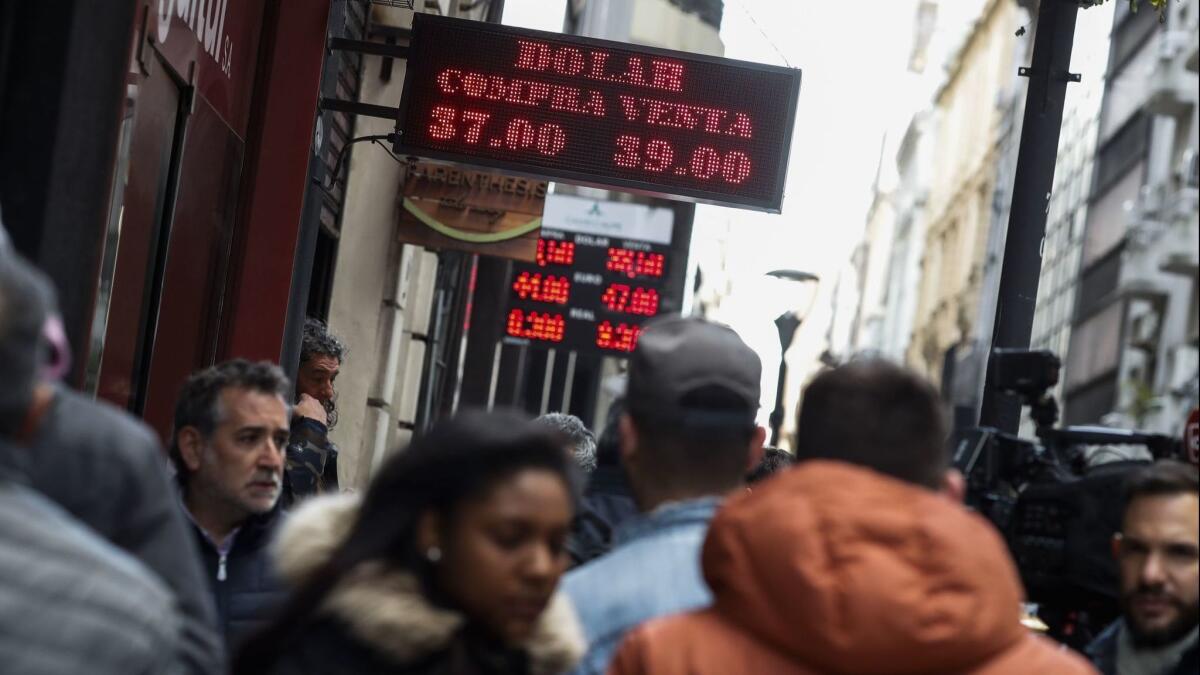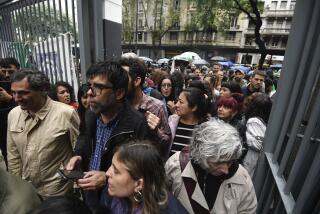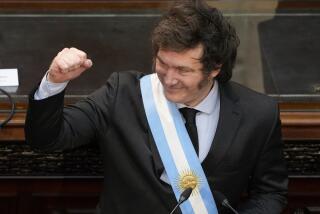The Argentine peso has lost half its value this year. Now the country is racing to prevent it from plunging further

Argentina, scrambling to avoid yet another financial crisis, is desperately trying to prop up the national currency after the peso lost 20% of its value in just one week.
The government said representatives will travel Monday to Washington to finalize a deal with the International Monetary Fund for $50 billion in financing through the rest of the year to further back the Argentine peso. But analysts were skeptical that the halt in the currency’s slide would last long.
“There is still a lack of confidence … and I think there will be plenty of turbulence in the days to come,” said Juan Luis Bour, chief economist at the FIEL think tank in Buenos Aires, the capital.
Still, efforts to shore up the peso’s plummeting value have had some effect. The peso closed the day Friday up slightly at 38.5 pesos to the dollar after a move by the central bank Thursday. The intervention involved the sale of hundreds of millions of dollars in a bid to stanch a frenzied demand for the U.S. currency.
The peso has steadily weakened this year, losing half its value, and the latest problems are seen as a sign of eroding confidence in the economic policies of President Mauricio Macri.
Argentina’s problems stem from many factors: the debt overhang from previous President Cristina Fernandez de Kirchner’s profligate social programs as well as unfavorable domestic events, including a historic drought that caused this year’s grain harvest to shrink by 25%. The country is expected to enter a recession this quarter, and the 2018 inflation rate could reach 30%.
Also negatively affecting the South American nation are the ripple effects of problems experienced by other developing economies, including Turkey and Indonesia. Wall Street analysts say global capital is exiting “emerging market” countries such as Argentina for the security of the U.S. and Europe, where investments are perceived as safer.
In office from 2007 to 2015, Fernandez spent lavishly on social programs and subsidies to fortify her populist base. But her budget deficits drove the country to virtual bankruptcy.
An ally of Venezuela’s late socialist President Hugo Chavez, Fernandez nationalized the private pension system in 2008 to help pay the bills, but it was a brief salve. Argentina has been in default on some of its public debt since 2012, said Bour, the FIEL economist. (Venezuela’s economy, meanwhile, is in meltdown, with inflation approaching 1 million percent.)
The center-right Macri, a former mayor of Buenos Aires, was elected president in 2015 on promises to reenergize an economy crippled by Fernandez’s populist programs, heavy regulation, high taxes and subsidized public services. Electricity and other services were essentially given away under Fernandez while price controls discouraged investment in new factories and stores.
Macri’s plan to slowly reintroduce market-based policies over a six-year period was rocked by an unexpected decline last year in foreign investment, leaving his government short of capital. His response was to double down on austerity measures that only deepened the slowdown. Though prudent economic policy, his elimination of Fernandez’s subsidized bus fares and utility rates have helped fuel inflation, Bour said.
“The conversion from a state-regulated and distorted economy to one based on the free market is always traumatic, as shown in the 1990s when the Soviet Union collapsed and Boris Yeltsin introduced market reforms,” Bour said. “The Russian economy shrank by something like 40% in two years.”
Macri’s economic minister, Nicolas Dujovne, said in a statement Friday that he would announce a new set of austerity measures Monday before traveling to Washington for talks with the IMF, prompting an encouraging reply from the international agency.
“Argentina can count on the full support of the fund,” IMF spokesman Gerry Rice said, “and we trust that the strong commitment and determination of Argentine authorities will help the country overcome its current difficulties.”
But Argentines are conspicuously lacking in confidence. An estimated $20 billion has fled the country this year, according to the central bank, and Argentines have converted more than $20 billion worth of pesos into dollars this year, signaling a lack of faith in Macri’s promises to stabilize the economy and fears that devaluations will continue to weaken the domestic currency.
Still fresh for many Argentines are the memories of Argentina’s last economic crisis in 2001-02, when a devaluation, high inflation and currency controls ultimately led to weeks of civil unrest in Buenos Aires and elsewhere. Political turmoil led to five presidents in less than two weeks.
Special correspondents D’Alessandro and Kraul reported from Buenos Aires and Bogota, Colombia, respectively.
More to Read
Start your day right
Sign up for Essential California for news, features and recommendations from the L.A. Times and beyond in your inbox six days a week.
You may occasionally receive promotional content from the Los Angeles Times.






